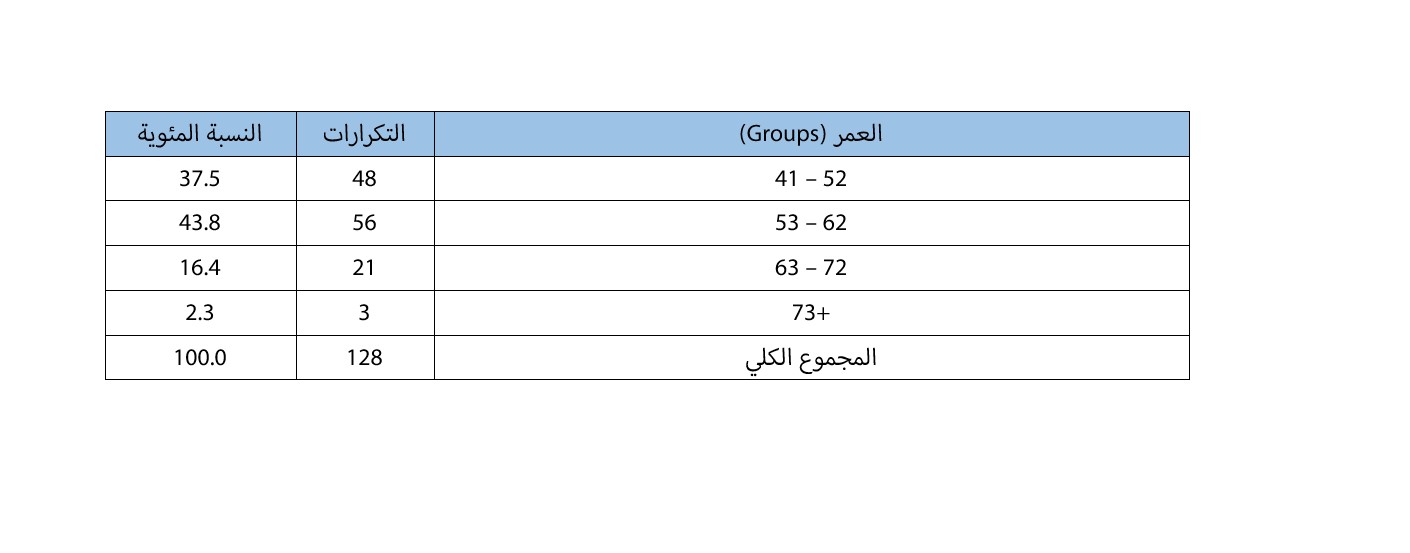Psychological Effects of genocide among the Faili Kurds
DOI:
https://doi.org/10.21271/zjhs.27.6.9الكلمات المفتاحية:
psychological effects ، post-traumatic effects، psychosocial distress، genocide، Faili Kurdsالملخص
The genocide of the Faili Kurds is a brutal and devastating attack. Successive regimes implemented measures against the Faili in several stages. The persecution which they were subjected to and the trauma they suffered as a result of genocide left far-reaching psychological and social effects in the hearts of their children, youth and elders. Thus, this research aims to identify the most important psychological effects of the genocide, including the effects of post-traumatic stress and psychological distress among the Faili Kurds, and identify the differences in the level of these effects according to the variables: gender, age, educational level, direct and indirect exposure to genocide, their place of settlement after the events of the genocide, and their social status. The sample consisted of (150) Faili Kurds, with (77) males and (73) females. The researchers used the analytical descriptive approach for the purpose of describing, analyzing and interpreting the research variables. and they prepared a scale to measure the effects of post-traumatic stress, and they were adopted (Kessler psychological distress scale). The face validity for the tow scales were verified, as the percentage reached (0.85) for the first scale and (0.90) for the second scale, also extracting the reliability of the two scales were verified, as it reached (0.89) for the first scale, and (0.92) for the second scale. The result has revealed that the respondents have a high level of post-traumatic effects, and a low level of psychological distress. There are no significant differences in post-traumatic effects according to gender, age, but there are significant differences according to the educational level, place of stability, direct or indirect exposure to trauma, and social status, and there are no significant differences in psychological distress according to educational level. But there are significant differences according to gender, direct or indirect exposure to genocide, place of settlement and marital status.
المراجع
-بشير، حكيم و بوعبيد حمزة (2021): مدى فعالية تقنية الـ EMDR في علاج اضطرابات ما بعد الصدمة لدى ضحايا حوادث المرور، دراسة ميدانية عيادية لحالات ضغط ما بعد الصدمة، كلية العلوم الاجتماعية والانسانية، جامعة العربي بن مهيدي " أم البواقي".
-دسوقي, حنان فوزي (2022): الخصائص السيكومترية لمقياس اضطراب ضغوط ما بعد الصدمة لدى المتعافين من فيروس كورونا 19-COVID من طلبة الجامعة، جامعة بني يوسف، مجلة كلية التربية، ع 1، ج1.
-ربيع، محمد شحاتة (2009). قياس الشخصية، ط2، دار المسيرة للنشر والتوزيع، عمان- الاردن.
-الشربيني، لطفي. (2003): صدمات الازمات والحروب وآثارها النفسية، العدد (75).
-عبدالله, ز. ا. (2021): آليات تخفيف الآثار النفسية لعمليات الابادة الجماعية، عمليات الانفال وابادة شنكال ، دراسة مقارنة. مجلة جامعة دهوك (عدد خاص) المؤتمر العلمي الدولي حول الابادة الجماعية / مركز دراسات الابادة الجماعية, 24(1), 284–29.
-عبدالهادي، نبيل (2002): مدخل الى القياس والتقويم التربوي واستخدامه في مجال التدريس الصفي، ط2، دار وائل للنشر والتوزيع، عمان- الاردن.
-العلوي، زكي جعفر الفيلي (2009): تأريخ الكرد الفيلييون وافاق المستقبل دراسة في الجذور التاريخية والجغرافية ومراحل النضال، ط1، الكوثر للطباعة.
-العلوي، زكي جعفر الفيلي (٢٠٠٩): تاريخ الكورد الفيليون وآفاق المستقبل دراسة في الجذور التاريخية والجغرافية ومراحل النضال. الطبعة الأولى.
-الفضل،منذر(2003):الكورد الفيليون وحقوقهم في مستقبل العراق. https://www.ahewar.org/debat/show.art.asp?aid=4146
تاريخ الزيارة: ١٠/١١/٢٠٢٢
-الفيلي، احمد ناصر (2017): الكورد الفيليون بين الماضي والحاضر، مالمو، السويد.
-كريم، فريدون، احمد ناصر الفيلي و رياض الفيلي (2014): الفيليون الانتماء والمحبة: جريمة تهجير الكورد الفيلية، سلسلة اصدارات الهيئة الوطنية العليا للمسائلة والعدالة الدائرة الاعلامية، المجلد الاول ، دار النهرين للطباعة.
-لحسن وشفيقة، العقون وكحول (2020): ترجمة وتقنين مقياس كيسلر للشدة النفسية (K10) على عينة من الشباب الجزائري، دراسات نفسية وتربوية، المجلد الثالث، عدد ٤، ص٣٣٨-٣٤٩.
محزري، جبران بن داحش علي (٢٠٢١): اضطراب مابعد الصدمة وعلاقته بقلق المستقبل لدى عينة من طلاب المرحلة الثانوية بمدارس الحد الجنوبي، مجلة كلية التربية، المجلد السابع والثلاثون، العدد السابع. http://previous.cabinet.gov.krd/a/d.aspx?a=4234&l=14&r=84&s=010000
تاريخ الزيارة: ١٥/١٠/٢٠٢٢
-Ebel, R. L. (1972): Essentials of Educational Measurement. N.J. Englewood Cliffs, Prentice Hall.
-Abbud, Z.K. (2016) ‘The Legal Liability in the Case of Faili Kurds, ‘Almasuliya al-qanuniya fi Qeziyat al-Kurd al-Failiyin’, (2121), pp. 14.
-Al-khafaf, E. S. (2017):” Post-traumatic Stress Disorder among Displaced People in Iraq”, KUFA JOURNAL FOR NURSING SCIENCES, 7(2), 2–9.
-Anne Pearlman, L. (2013): Restoring Self in Community: Collective Approaches to Psychological Trauma after Genocide. Journal of Social Issues, 69(1), 111–124. https://doi.org/10.1111/josi.12006
-Baser, B. & Toivanen, M. (2017): The politics of genocide recognition: Kurdish nationbuilding and commemoration in the post-Saddam era. Journal of Genocide Research, 19(3), 404-426.
-Bolton Paul, et al. (2013): The mental health and psychosocial problems of survivors of torture and genocide in Kurdistan, Northern Iraq: A brief qualitative study. Scientific article, Vol 23. No 1.
-Braamse AM, et al. (2010): Distress and quality of life after autologous stem cell transplantation: a randomized clinical trial to evaluate the outcome of a web-based stepped care intervention. BMC Cancer; 10:361.
-Cuijpers P, et al. (2009):Screening for mood and anxiety disorders with the five-item, the three-item, and the two-item mental health inventory. Psychiatry Res. 2009;168:250–5.
-Dworkin, J., et al. (2008): The long-term psychosocial impact of a surprise chemical weapons attack on civilians in halabja, Iraqi kurdistan. Journal of Nervous and Mental Disease, 196(10), 772–775. https://doi.org/10.1097/NMD.0b013e3181878b69 access date:03-10-2022
-Ehlers, A, & Clark, D. (2000): A cognitive model of posttraumatic stress disorder. Behaviour Research and Therapy.
-Ehlers, A, et al. (2013): Implementation of cognitive therapy in routine clinical cave: Effectiveness and moderators of outcome in a consecutive sample, Behavionr Research and therapy, 51 ,742 – 752, doj, 10, 1016 / j trat , 2013 , 08. 006.
-Fawcett, J. and Tanner, V. (2002): The internally displaced people of Iraq. Brookings Institution-SAIS Project on Internal Displacement.
-Foa, E.B., & Cahill, S.P. (2001): Emotional processing in psychological therapies. In N.J. Smelser & P.B. Bates (Eds.), International encyclopedia of the social and behavioral science (pp. 12363–12369). New York: Elsevier.
-Gunter, M.M. (2009): The A to Z of the Kurds. Scarecrow Press.Katrinli Seyma, et al. (2022): The role of the immune system in posttraumatic stress disorder. Translational Psychiatry volume 12, Article number: 313.
-Kaveh, C. (2014). Folkemord i Kurdistan – et eksempel pa politicide? In B. Hagtvet, N. Brandal & D. E. Thorsen (Eds.), Folkemordenes svarte bok. (2nd Edition, pp. 191-205). Oslo: Universitetsforlaget.
-KAYNAKÇI F. ZEHRA (2017): A MODEL FOR PSYCHOLOGICAL DISTRESS AMONG UNIVERSITY STUDENTS: MINDFULNESS, DECENTERING, REFRAMING, AND INDIRECT EFFECT OF EMOTION REGULATION DIFFICULTIES. A THESIS SUBMITTED TO THE GRADUATE SCHOOL OF SOCIAL SCIENCES . MIDDLE EAST TECHNICAL UNIVERSITY.
-Lauren C.Ng, et al. (2015): Life after Genocide: Mental health, Education, and Social Support of orphaned survivors. Int perspect Psycho, 4(2): 83-97. https://www.ncbi.nlm.nih.gov/pmc/articles/PMC4517679/
-Leyro, T., Zvolensky, M., & Bernstein, A. (2010): Distress tolerance and psychopathological symptoms and disorders: A review of the empirical literature among adults. Psychological Bulletin, 136(4), 576–600.
-Litz, B,T, & kean, T,M, (1989): information processing in anxiety disorder application to the under standing of the PTSD. Clinical psychology Review, q (2).
-Macera, Caroline A. et al. (2014): Posttraumatic Stress Disorder After Combat Zone Deployment Among Navy and Marine Corps Men and Women. JOURNAL OF WOMEN’S HEALTH Volume 23, Number 6.
-Miao , Xue, et al. (2018): Posttraumatic stress disorder: from diagnosis to prevention. Miao et al. Military Medical Research , 5:32.
-Montgomery M. & McCrone S.H. (2017): Psychological distress associated with the diagnostic phase for suspected breast cancer: systematic review. Journal of Advanced Nursing 66(11 ), 2372-2390.
-Potter P.J. (2016): Breast biopsy and distress: feasibility of testing a Reiki intervention. Journal of Holistic Nursing 25(4), 238-248.
-Regema L, Eet al. (2015): Traumatic episods and mental health effects in young men and women in Rwanda, 17 years after the genocide. Stroke and Vascular neurology BMJ. Volume 5, Issue 6. P1-11. https://bmjopen.bmj.com/content/5/6/e006778 access date: 12-11-2022
-Resick, P. & Schnicke, M. (1992): Cogntive processing therapy for sexual assault victims. Journal of Consulting and Clinical Psychology
-Shani-Leigh S. C. (2017): THE DEFINITION AND PREVENTION OF GENOCIDE: A RHETORIAL ANALYSIS OF THE UNITED NATIONS. A thesis presented to the faculty of the Graduate School of Western Carolina University in partial fulfillment of the requirements for the degree of Master of Arts in English. Western Carolina University.
-Solomon Z, et al. (2017): The Implication of Combat Stress and PTSD trajectories in metabolic syndrome and elevated c-reactive protein levels: a longitudinal study. J Clin Psychiatry. 78: 1180–1186.
-Taneja, P. (2011): Iraq’s Minorities: Participation in Public Life. Minority Rights Group International.
-Toft H, et al. (2018): PTSD patients show increasing cytokine levels during treatment despite reduced psychological distress. Neuropsychiatr Dis Treat.14:2367–78.
-Viertiö Satu, et al. (2021): Factors contributing to psychological distress in the working population, with a special reference to gender difference. BMC Public Health (2021) 21:611.

التنزيلات
منشور
كيفية الاقتباس
إصدار
القسم
الرخصة
الحقوق الفكرية (c) 2023 Hawzheen Mahmood Azeez ; Gian Kamil Hassan

هذا العمل مرخص بموجب Creative Commons Attribution-NonCommercial-ShareAlike 4.0 International License.
Except where otherwise noted, content on this site is licenced
under a Creative Commons Attribution License 4.0 (CC BY- 4.0)









